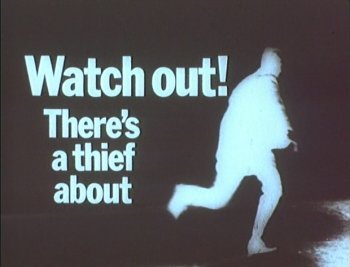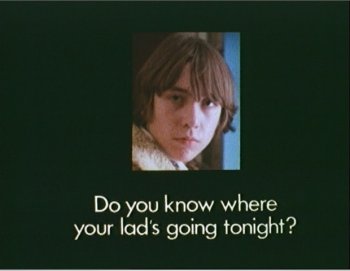The Good Old Days? - Watch Out!
Crime. One unfortunate side-effect of human society is the desire of some humans to harm others. Societies throughout the ages have devised ways to cope with this, and it probably tells us everything we need to know about today's society that most PIFs concern themselves with crime against property.
 |
Watch Out! - Car Theft (1973)
This was part of the famous 'Watch out! There's a thief about' campaign. A car thief steals someone's car whilst they're at a football match, and we see the car being driven to a garage to be resprayed, all while the owner is telling his friend about the car in the voiceover. The message at the end is to lock all doors, close all windows, and to take the key with you. Nowadays, drivers are far more savvy about car security; in fact, an entire industry has grown up around it. However, the focus for thieves moved to what was inside the car; firstly, car radios, and when they became much harder to steal, satellite navigation units.
Tell the Police (1963)
This encourages people to look out for possible intruders, and to always call the police if they see anything suspicious. Rightly or wrongly, there's a lack of confidence among the population of the UK nowadays that the police will investigate every call they get, and it's interesting that the focus for public campaigns changed soon after this to put the onus on the property owner. It's likely that this was in response to the increase in personal wealth over the 20th century, especially from the 1980s onwards. There was a good reason people could leave their doors open in the old days; they usually didn't have anything worth nicking.
Menace (1970)
A rather threatening PIF claiming that someone 'watching this programme' (so obviously planned for commercial breaks) would be burgled tonight. It's part of the 'If it opens, lock it' campaign. It seems an unlikely claim for the time, and is even more unlikely now in a multi-channel and home entertainment environment. Still, the advice is sound.
 |
Pick Pockets (1975)
A frankly unforgettable PIF, which opens with the caption "SNATCH OF THE DAY". The first time I saw this, I was incapaciated for around 5 minutes or so whilst I tried to stop laughing. A pickpocket is interviewed whilst he explains the various ways he can steal from the unwary. According to him, the one place he can't snatch is a nudist colony. Quite.
Purse Snatcher (1971)/Guard Your Purse (1973)
A dodgy looking sort in Safeway nicks some poor woman's purse, and a gossiping old woman realises too late that someone's come along and swiped hers as well. As the PIF says; look after your purse - before someone else does.
Bicycle Thefts (1974)/A Thief Would Like Your Bike (70s)
Lots of comic performances here, as people report the theft of their bike but can't describe it, didn't lock it to something, left valuables in the saddlebag and don't know the frame number. It's all topped off by a constable coming into the station and saying "You're not going to believe this, Sarge, but somebody's nicked me bike!". In the second PIF, Derek Griffiths larks about whilst warning us that we ought to take precautions against our bike being nicked.
Again, a whole industry has grown up around bike security, but the thefts continue unabated.
 |
Where's Your Lad? (1980)/Fireworks - Where's Your Lad Tonight? (1976)
A stark warning to parents; if you don't know where your teenage son (or daughter) is at night, chances are that they're up to no good. A warning that's still relevant today. The same message is in the second PIF, emphasised for the period around Bonfire Night, when fireworks are easier to get hold of.
Vandalism (1976)
A group of residents angrily clear up their street after some vandals have been at it. They talk about how they feel powerless to stop it, and the voiceover explains that there is something you can do - call the police. However, the competing demands on the police service nowadays means that they can't often catch the vandals in the act.
The little toerags, eh? The message is still the same today; if you've got stuff, protect it, because someone else wants it.
About this entry
- By Tanya Jones
- Posted on Saturday, April 19 2008 @ 8:09 pm
- Categorised in TV, Analysis
- Tagged with PIF
- 6 comments

and it probably tells us everything we need to know about today's society that most PIFs concern themselves with crime against property.
Isn't it more the case that is tells us more about the sort of crime people were likely to experience first-hand in the 1970s/80s than about the supposedly-materialistic values of that society (I assume the latter is what you were alluding to with the comment I quoted)?
By Zagrebo
April 22, 2008 @ 7:16 pm
reply / #
Well...isn't that a bit of a chicken vs egg question? You have to have property to suffer a crime against it, surely?
By Tanya Jones
April 22, 2008 @ 10:39 pm
reply / #
Well, yes; but my point is that property crime is by far the crime people are most likely to suffer from not because they particularly value or hoard property but because it's the easiest and most likely thing for criminals to target and therefore going to be the largest focus of PIFs. An old bloke who doesn't really own much in the world might have a bike and so is likely to become a target for thieves in the same way a simliar bike owned by a materialistic yuppie can. People who have had purses stolen don't tend to be carefully-selected based on material status - if a thief can take a purse they will (and do).
It doesn't really tell us anything about a society beyond what criminals find easiest to target in it and that these things don't really change (as I think you mention, most of the PIFs are equally applicable today). In fact, in this last regard its an interesting contrast to the road safety PIFs many of which were applicable to specific times (the caution about neglected brakes on a car that had been mothballed, for instance).
By Zagrebo
April 23, 2008 @ 12:04 pm
reply / #
I think what I meant was pretty much what you're saying; that the biggest threat to someone in this society is property theft, because the larger amount of people who have property makes it an easier thing to commit a crime against. Sorry; perhaps I'm being thick, but I don't see how we disagree, particularly.
By Tanya Jones
April 23, 2008 @ 2:28 pm
reply / #
Ah, I see. What I took your opening comment to be was a small dig at society for supposedly being over-materialistic and valueing property over other things and that these PIFs reflected that (ie that the "worst" sort of crimes would be those against property) rather than, as I said, simply that property crimes were those people were most likely to suffer from regardless of outlook.
Apologies for misunderstanding, it's just hard to read a line like "it probably tells us everything we need to know about today's society" without assuming it's condemning something; probably related to having heard it so many times in that sort of context.
By Zagrebo
April 23, 2008 @ 3:11 pm
reply / #
Oh, I see! No, it's related to my theory that PIFs tell us a lot about a society, as they reflect social concerns and ills; a bit like the PIF you cite reflecting that car safety wasn't appreciated much in the early days of car ownership.
By Tanya Jones
April 23, 2008 @ 10:18 pm
reply / #